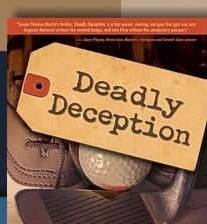PROLOGUE:
The perfect windless day kept the tear gas hovering near the ground.
Men, women and children panicked. They ran from the grandstands
for the locked stadium gates and were slammed against them. Pushing
and shoving, hundreds more flowed from the stands. The crushing
force squeezed the breath from their lungs.
The first to reach the gates were the first to die. The crowd kept
coming. More died. Until three hundred had suffocated to death.
The Guinness Book of World Records lists the incident as the worst
calamity ever at a soccer match.
CHAPTER
1:
A scream pierced the air, startling the hushed crowd of spectators.
Twenty-five thousand were on hand at Augusta National Golf Club
for the final day of the Masters Tournament. One golfer, dapper
in his knickers and jaunty cap, was setting up for a crucial putt
at Amen Corner, the 13th hole. His distinctive timing and rhythm
would help him win his first green jacket later that day.
Total silence reigned. Cellphones were turned off, cameras and radios
left in cars. No one spoke, not a soul. The gallery was still. Until
the scream.
The golfer pulled back, stood straight, and looked up the path toward
the distraction. The spectators turned in unison. Frowning gallery
guards rushed in the direction of the sound.
“Hurry, hurry,” shouted a woman halfway up the path.
Tranquillity at the National ended. Alongside the path, a man’s
body lay in a near-fetal position in a cluster of deep pink azaleas.
Blood had pooled under him and flowed into the bed of pine straw
upon which his body rested. His Masters badge hung across his chest.
When news of the murder spread, a black pall was forever cast over
the prestigious golf course. But for now beauty prevailed at the
National: white dogwood, its delicate blossoms like magnificent
baby’s breath, interspersed beneath tall pines and shorter
firs; pink, and red, and fuchsia azaleas lined the edges of a smooth
velvet carpet of grass; stone bridges reflected in glistening water.
A clear blue sky completed the perfect picture.
CHAPTER 29:
Luis opened the
hall door quietly. Elia stuck her head out and checked the hall.
Lights were still on downstairs. They left the room and walked
silently to the top of the staircase. Elia placed her feet on the
very edge of each step. Luis mimicked her movements as they
descended. Snatches of conversation drifted from the dining room.
Luis followed
Elia to the front door, reached around her, and turned the knob. It
was locked. Elia’s eyes darted about. Luis looked around, too. He
shook his head. No key was in sight. They tiptoed to
the study. Quietly, Elia pushed open the door and closed it behind
them. “Let me show you something,” she whispered. She turned to
the patio door and released the lock. The door slid open. A fresh
breeze rustled the flowing draperies that hid a control panel. A
red light blinked unseen.
A sudden beep
startled them and halted their progress. “Carajo.”
Luis grabbed Elia’s hand and pushed her forward. They ran toward
the garage. By the time they reached it, an alarm was blaring in
the house. But the heavy garage doors were locked.
Elia ran around
the building and tried a side door. It wouldn’t budge. She kicked
it hard. “Dammit." They ran toward the barn. The simple
latch on its door slid open. Luis looked behind them and saw two
figures running across the yard. He started to pull two saddles off
the rack.
“What are
you doing?” Elia pulled a stool over to a horse and got on
bareback. “Come on, just get on.” She leaned low over the neck of
her horse and dug her heels into its flanks. She shot off. Luis
hesitated a half second, then grabbed the mane of a second horse and
hoisted himself up. His horse bolted out of the barn.
“Are you
okay?” Elia yelled to Luis.
“I’m fine. Go!”
The moon was
obstructed by clouds. The riders couldn’t see past the horses’
noses. But the paso finos knew the path. They ran free,
their long manes and full tails flowing.
Luis and Elia
could hear a car engine revving behind them. They looked over their
shoulders and saw headlights approaching. The lights swung to the
left as the car raced onto a parallel road. Only a copse of trees
separated the car from the path. Briefly, the car and horses were
neck and neck. Then the car jolted forward and was gone.
Elia slowed
her horse and waited for Luis to catch up. “Why do you think they
passed us?” she asked.
|



